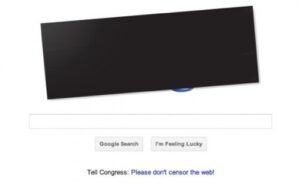 Some of the Internet’s biggest, and smallest, players joined forces this week to protest the proposed Stop Online Piracy Act (SOPA).
Some of the Internet’s biggest, and smallest, players joined forces this week to protest the proposed Stop Online Piracy Act (SOPA).
Protests ranged from Wikipedia (and about 10,000 other site) shutting down completely for the day to individuals who placed small graphics on their Facebook pages. Offline, Internet users flooded the switchboards in Washington to let the elected representatives know they weren’t happy about the proposed bill. The action was so widespread, one forum poster was left asking, “Did the Internet just explode?”
So what is about SOPA that had everyone so worked up and what, if any, impact did the protests have in Washington?
SOPA Basics
SOPA is a set of laws designed to curb online piracy of copyrighted materials, mainly, by foreign web sites. It’s backed by the music and movie industries and had plenty of support on Capitol Hill.
Critics of the proposed measures gave copyright holders too much power to shut down websites suspected of hosting pirated material. Under provisions of the bill, copyright holders could have suspected pirate sites shut down by merely writing a letter to the Justice Department (DOJ). The DOJ would then make a formal request to the Internet service provider (ISP) to block traffic to the site. This method is very familiar to anyone in China who creates a blog criticizing the Chinese government.
While SOPA is heavy on how to shut down a site, it’s less clear on how web masters could get their sites back up once they’d been shuttered. That, the critics said, left too much potential for abuse.
Protest Fallout
The protests drew massive attention to the issue and even caused a couple of the bill’s biggest supporters to back down away from the bill a bit. Senator Orrin Hatch (Utah-R), who originally brought the bill to the Senate floor, suggested that lawmakers take another look at the bill because it was, “ready for prime time.” Other Senators suggested that an amended version of the bill would be offered up in February.
While many on the Internet took these actions to mean they’d won the battle, others were cautiously optimistic. The bill’s primary supporters, the Recording Industry Association of America (RIAA) and the Motion Picture Association of America (MPAA) have very powerful lobbying arms in Washington and are used to getting what they want. So there’s no telling what future versions of the bill will look like. The Senate will debate SOPA on January 24.
Effects on Gambling Sites
The SOPA protests were watched closely by the igaming industry, especially those who know what it’s like to have their sites shuttered. And while many gaming sites participated, or at least supported, the protests, SOPA’s potential impact on gambling sites wasn’t completely clear. After all, most poker sites aren’t hosting pirated copyrighted materials. Still, SOPA’s potential for abuse makes it an issue worth watching.
Internet Power
This isn’t the first big Internet protest we’ve seen lately, though it seemed to be the largest. Just last month web users exploded in fury when Bank of America proposed a $5 monthly fee for debit card holders. The company quickly backed off the plan as the protests gained attention and support.
It’s very likely that we’ll see a lot more web-based protests like this in the future, especially if the fight against SOPA is successful.
What did you think of the SOPA protests? Let us know in our Online Gambling Laws and Regulations Forum.
